9 Best & Worst Mozzarella Cheeses, According to Dietitians
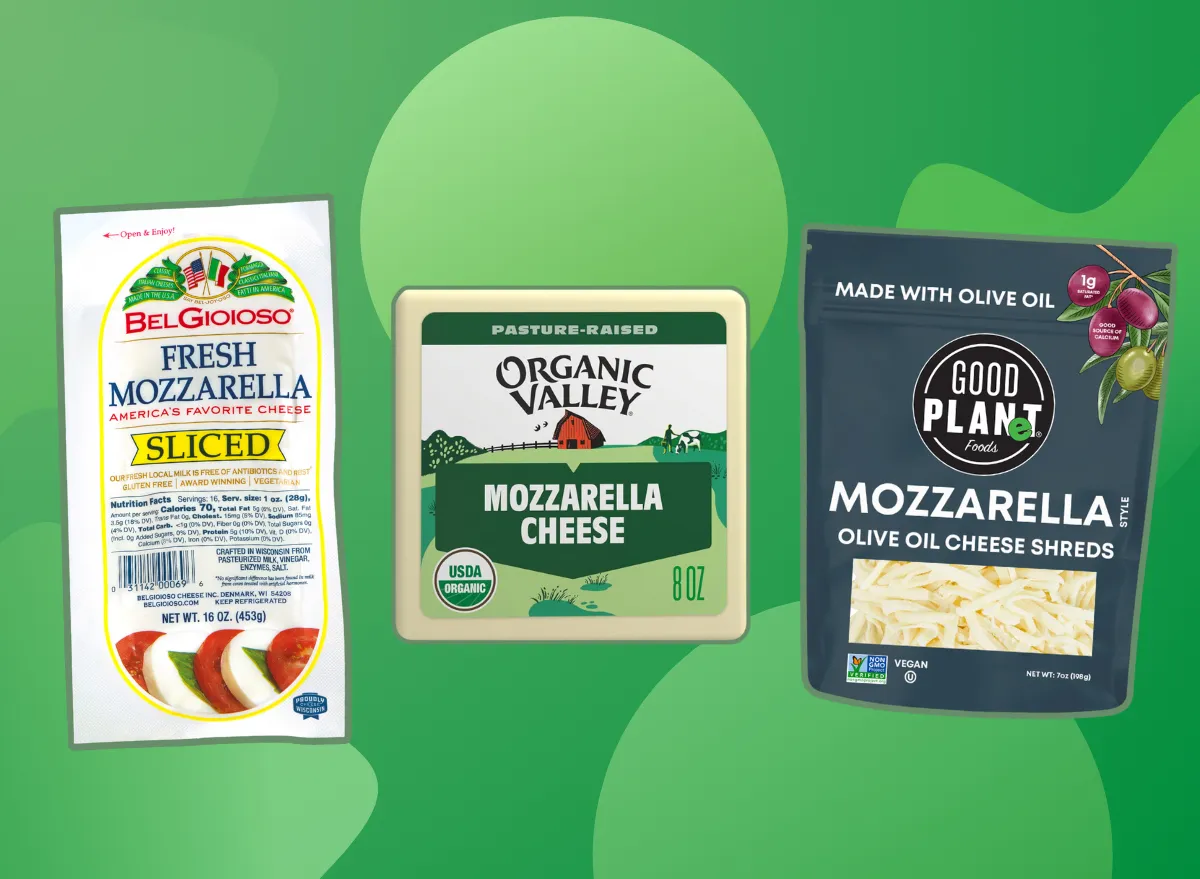
Nothing lights up a cheese lover’s eyes quite like the sight of delightfully soft, stringy mozzarella. This star of the cheese world is a true chameleon, seamlessly blending into a multitude of dishes, from fresh salads to bubbling hot lasagnas.
The secret behind the best mozzarella cheese lies in its perfect balance of creamy texture and subtly tangy flavor, making it an irresistible treat for the taste buds. Why is this cheese so popular? Nutritionally, some cheese aficionados are promoting mozzarella’s naturally lower saturated fat and sodium content (as compared to other cheeses), and fresh, block, and shredded varieties are also made with part-skim milk that cuts down on those fat counts even more.
As mozzarella comes in a variety of textures and makes—from fresh, to low-moisture, even to little-known varieties such as Scamorza—it can be hard to decide which is right for you and your cooking needs. With the rise in health consciousness, many brands are transparent in their cheese-making process and sell only quality ingredients. However, some brands out there are masking a smorgasbord of not-so-healthy additives and ingredients that can diminish any nutritional value. We chose three main criteria when picking the healthiest mozzarellas on the market so that you can sit back, relax, and indulge.
How we chose the best mozzarella cheeses:
We followed the following criteria when choosing what we consider the healthiest mozzarellas on the grocery store shelves:
- Low Sodium: Mozzarella is naturally low in sodium, unlike other cheeses such as Feta which, although delicious, has been brined, and is therefore very high in sodium. That being said, many companies, especially in mozzarellas that are shredded or blocked, have had salt added to preserve freshness and heighten flavor. As the American Heart Association recommends no more than 2,300 milligrams a day for the average adult—and promotes an ideal of 1,500 milligrams per day—it’s important to keep an eye on your sodium counts as they directly contribute to hypertension, heart disease, and early morbidity rates.
- High Calcium Content: This one may be a no-brainer, but certain cheeses contain more calcium than others. As a rule of thumb, hard cheeses tend to contain more calcium as the evaporation process concentrates the calcium within the cheese. As mozzarella is semi-hard, it’s important to make sure you’re still choosing a cheese that’s high in calcium as this nutrient supports bone health. All of our choices include at least 6% of your daily calcium intake with the majority hovering around 15%.
- No Artificial Ingredients or Colors: Believe it or not, even mozzarella isn’t without its unnecessary additives. Although few companies add that horrifying orange tinge to mozzarella (cheddar, on the other hand, is a whole other ball game), many cheeses still contain artificial ingredients such as preservatives or acid correctors. While it’s up for debate whether or not these ingredients are linked to health concerns, it’s nice to know that what you’re eating is free from these additions to eradicate any guesswork. Even our dairy-free option forgoes any artificial ingredients while our shredded option contains cellulose, a plant-derived compound that prevents caking.
The Best Mozzarella Cheeses
Best: Organic Valley Low Moisture Mozzarella, Part Skim
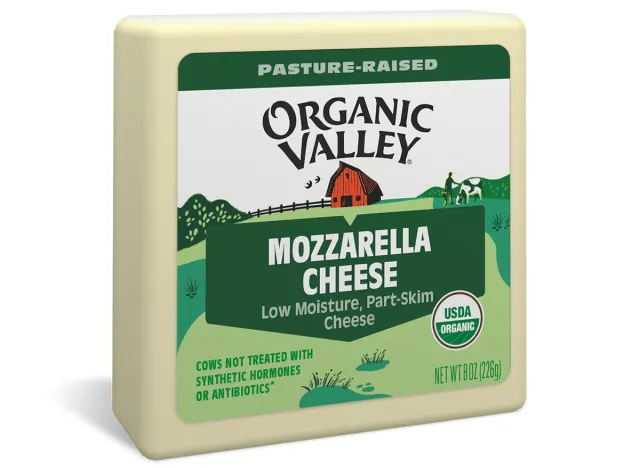
Organic Valley is widely available across nearly all grocery stores, and their USDA-certified organic products are produced with no added hormones, antibiotics, or toxic pesticides. This mozzarella is “low-moisture,” meaning that you can pair this cheese with your charcuterie board or melt it atop your favorite pizza without any sogginess. This cheese also boasts 7 grams of protein per serving to help keep your tummy satiated after your meal.
Best: Frigo Cheese Heads String Cheese
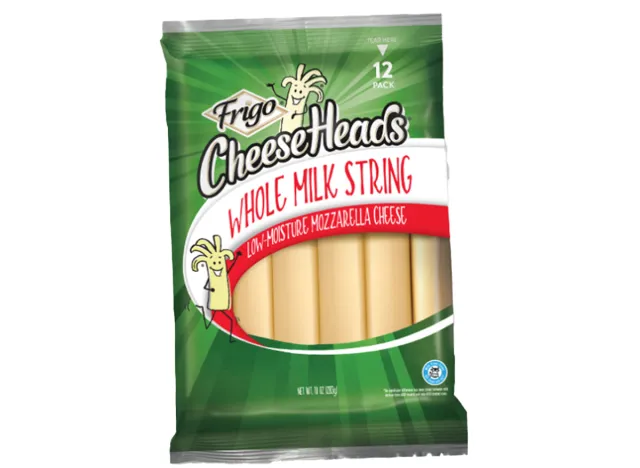
Admit it, even we grown-ups love string cheese, especially when we’re snacking on the go. “I like individual serving cheeses, like Frigo Cheese Heads string cheese,” says Kacie Barnes, MCN, RD, a Dallas-based registered dietitian. “With one string cheese, you get 6 grams of protein and 220 milligrams of calcium [which is] about the same amount of calcium in 6 ounces of milk.” So when you’re throwing them in your child’s lunchbox, don’t forget to pack one for yourself, too!
Best: GOOD PLANeT’s Mozzarella Olive Oil Cheese Shreds
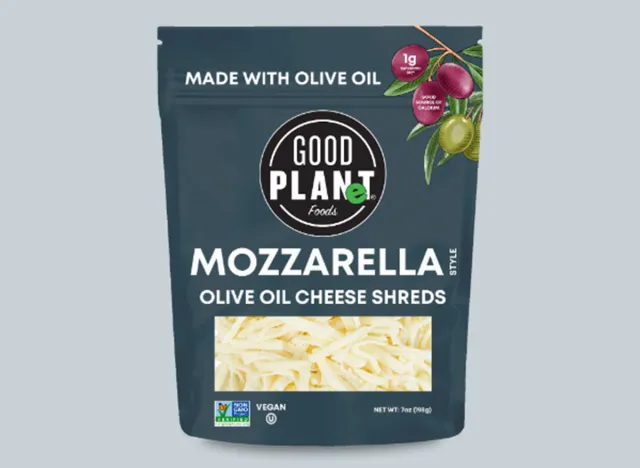
If you’re following a vegan or dairy-free lifestyle, GOOD PLANeT may be a great option. This dairy-free mozzarella cheese is made with olive oil, and “the inclusion of olive oil means the Olive Oil Cheese offers the benefits of healthy unsaturated fats with little saturated fat,” says Bianca Tamburello, RD, registered dietitian. “Olive oil is linked to loads of benefits including [support of] heart and brain health. Plus the Olive Oil Cheese is delicious and melts perfectly on pizzas, pasta, and all your melted cheese needs.”
Best: Belfiore Mozzarella Cheese
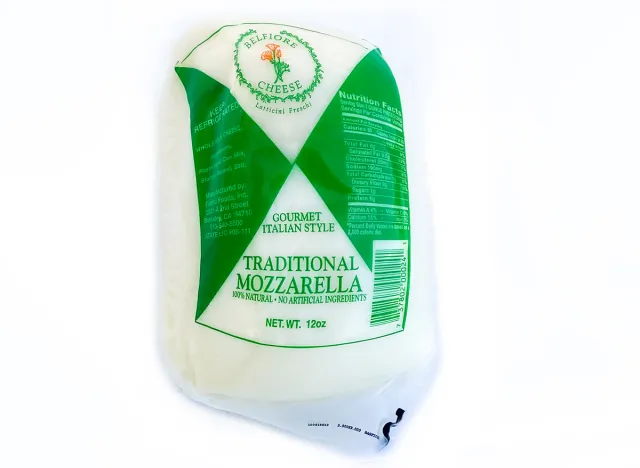
If you’re in the market for something a bit more traditional, perhaps a bit more high-end, we recommend Belfiore’s block mozzarella. With milk from California cows, produced by California farmers, this cheese is 100% all-natural with no artificial ingredients. This low-carb, high protein-cheese has been mildly brined, aged, and vacuum sealed to preserve freshness, and the cheese is produced with Grade “A” r-BST free milk and live Probiotic Lactic cultures which have been linked to a healthy gut microbiome.
Best: Whole Foods 365 Ciliegine Mozzarella
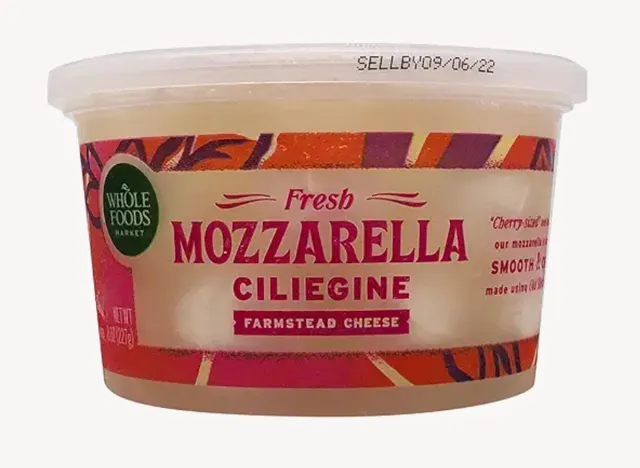
These cherry-sized flavor bombs are perfect for entertaining as they make a great accompaniment on any charcuterie board. Whole Foods 365 brand ensures quality ingredients and each serving provides 4 grams of protein and 6% of your daily calcium needs. Although this brand does have slightly higher saturated fat counts than other brands, the sodium is much lower – as is the carbohydrate and sugar constitution. Therefore, it’s up to personal choice, but despite the higher saturated fat count, this cheese can be nutritious when eaten in moderation alongside lean meats, whole grain crackers, and fruits.
Best: BelGioioso Fresh Mozzarella Cheese, Sliced
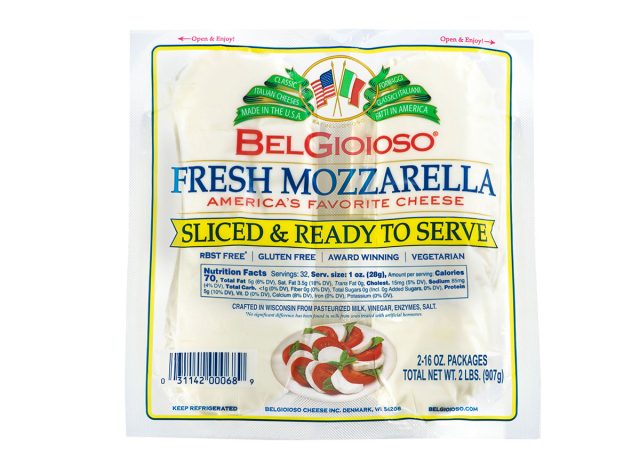
BelGioioso is a widely-known name in the cheese business, and its fresh mozzarella cheese is instantly recognizable. We love their mozzarella cheese not only because of its robust taste but because of their claims and transparency available right on their home page. All farmers who work with BelGioioso have signed a pledge not to treat their cows with the synthetic hormone rBST which, although health risks have proven inconclusive in humans, may cause harm to the treated cows, according to the American Cancer Society.
Best: Organic Valley Finely Shredded Low Moisture Mozzarella, Part Skim
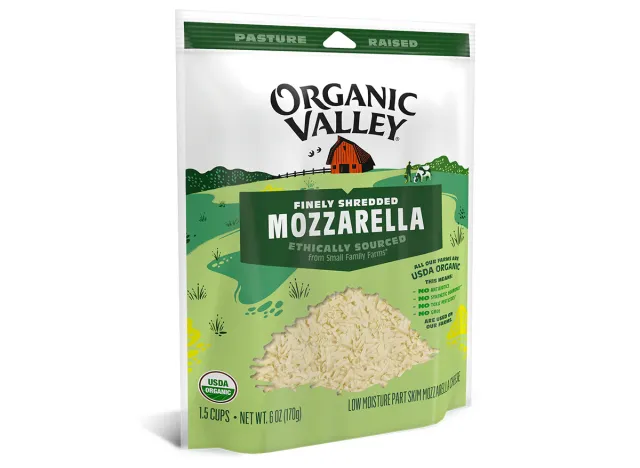
Many consumers opt to buy their mozzarella shredded as it’s a much easier mess-free way to top your pizzas, salads, or even soups when you’re short on time. Organic Valley has made our list twice, this time with their shredded mozzarella which contains 7 grams of protein and 190 milligrams, which is approximately 15% of your daily calcium intake! Additionally, this cheese contains 6% of your daily potassium needs and 2% of your daily potassium intake, so you’re getting a greater nutritional punch than you would from other brands.
The Worst Mozzarella Cheeses
Worst: Kraft Mozzarella Singles
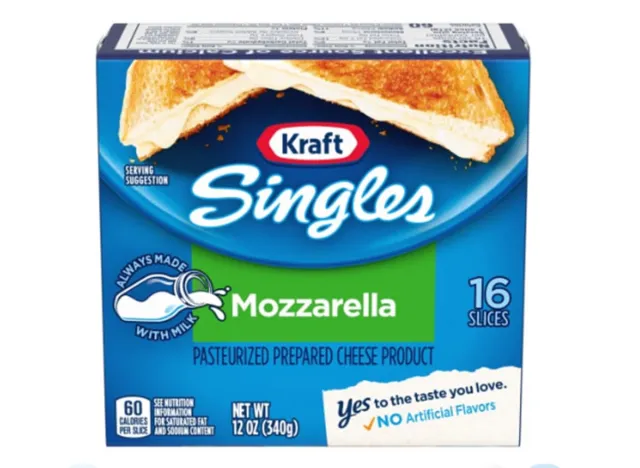
While this isn’t a terrible choice, with so many other mozzarella choices out there, why opt for one that isn’t even classified as a true cheese? (It’s technically a pasteurized prepared “cheese product.”) This option is also relatively high in sodium and lower in protein than many other options.
Worst: Borden Double Twist String Cheese
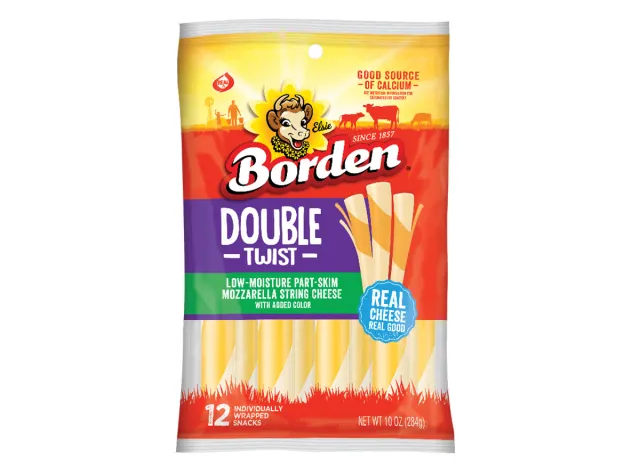
Borden’s mozzarella string cheese sticks are confusing if anything else. Although they are mozzarella cheese, these “twists” have a colored orange strip that makes it look like a mozzarella and cheddar combination. The orange, thankfully, has been colored naturally using annatto (made from the seeds of the achiote tree). However, certain populations may be allergic to this plant while others have experienced heightened IBS symptoms after consumption. Our advice? Stick to products that don’t use any coloring to be on the safe side.
- Source: Messerli, F. H., Hofstetter, L., Syrogiannouli, L., Rexhaj, E., Siontis, G. C. M., Seiler, C., & Bangalore, S. (2021). Sodium intake, life expectancy, and all-cause mortality. European heart journal, 42(21), 2103–2112. https://doi.org/10.1093/eurheartj/ehaa947
- Source: Zhu, K., & Prince, R. L. (2012). Calcium and bone. Clinical biochemistry, 45(12), 936–942. https://doi.org/10.1016/j.clinbiochem.2012.05.006
- Source: Perona, J. S., Cañizares, J., Montero, E., Sánchez-Domínguez, J. M., Catalá, A., & Ruiz-Gutiérrez, V. (2004). Virgin olive oil reduces blood pressure in hypertensive elderly subjects. Clinical nutrition (Edinburgh, Scotland), 23(5), 1113–1121. https://doi.org/10.1016/j.clnu.2004.02.004
- Source: Abuznait, A. H., Qosa, H., Busnena, B. A., El Sayed, K. A., & Kaddoumi, A. (2013). Olive-oil-derived oleocanthal enhances β-amyloid clearance as a potential neuroprotective mechanism against Alzheimer's disease: in vitro and in vivo studies. ACS chemical neuroscience, 4(6), 973–982. https://doi.org/10.1021/cn400024q
- Source: Sanders, M. E., Merenstein, D. J., Reid, G., Gibson, G. R., & Rastall, R. A. (2019). Probiotics and prebiotics in intestinal health and disease: from biology to the clinic. Nature reviews. Gastroenterology & hepatology, 16(10), 605–616. https://doi.org/10.1038/s41575-019-0173-3
- Source: Recombinant bovine growth hormone. (n.d.). American Cancer Society. https://www.cancer.org/cancer/risk-prevention/chemicals/recombinant-bovine-growth-hormone.html
- Source: Ulbricht, C., Windsor, R. C., Brigham, A., Bryan, J. K., Conquer, J., Costa, D., Giese, N., Guilford, J., Higdon, E. R., Holmes, K., Isaac, R., Jingst, S., Kats, J., Peery, L., Rusie, E., Savinainen, A., Schoen, T., Stock, T., Tanguay-Colucci, S., & Weissner, W. (2012). An evidence-based systematic review of annatto (Bixa orellana L.) by the Natural Standard Research Collaboration. Journal of dietary supplements, 9(1), 57–77. https://doi.org/10.3109/19390211.2012.653530
- Source: Stein H. L. (2009). Annatto and IBS. Journal of clinical gastroenterology, 43(10), 1014–1015. https://doi.org/10.1097/MCG.0b013e3181ae4e1b









